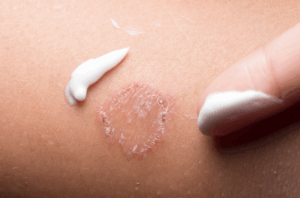Ringworm
 Ringworm is the common name for a superficial fungal skin infection – it isn’t really a worm! Fungal infections thrive in damp, warm conditions and can be found on the scalp, body, groin, or feet. Fungal infections are typically referred to the location of the body they are found, for example, athlete’s foot and jock itch.
Ringworm is the common name for a superficial fungal skin infection – it isn’t really a worm! Fungal infections thrive in damp, warm conditions and can be found on the scalp, body, groin, or feet. Fungal infections are typically referred to the location of the body they are found, for example, athlete’s foot and jock itch.
Anyone can get ringworm. You are at higher risk when you:
- live in close quarters with others,
- use public locker rooms or showers,
- play contact sports,
- have a weakened immune system or an autoimmune condition,
- work closely with animals that may carry the fungus.
How does it spread
Ringworm spreads easily from person to person. It takes 1-3 weeks after contact with the fungus before you will see it yourself. It can survive on the skin, surfaces, and even in soil.
The infection spreads through:
- direct contact with the rash of an infected person or animal,
- by touching contaminated objects or areas. For example, someone might contract ringworm by touching an infected area and then touching other parts of their body,
- or by coming into contact with contaminated surfaces—like a locker room floor—where an infected person has walked barefoot.
What are the symptoms?
Ringworm starts as a red, scaly patch that begins to extend into a scaly ring-shaped lesion with a slightly raised scaly border. The inside of the ring can be clear or scaly with a scattering of bumps. Thinning hair or loss inside the ring, as well as overlapping rings, are common. Itchiness is common in the affected area.
What you can do
If you suspect your child has ringworm, consult your doctor. A simple test can confirm the infection. Ringworm treatment may include over-the-counter antifungal creams, sprays, or powders. More serious infections may need prescription medicine, either topical (put on skin) or medication.
How can I prevent the spread of ringworm?
- Treat the affected area.
- It’s important to keep the affected area clean and dry. Especially after showering or in sweaty areas after exercising
- Frequent hand washing, especially after playing with pets.
- Avoid sharing personal items such as towels or facecloths.
- Frequent cleaning of surfaces that are commonly touched, such as door handles and toys. The ringworm fungus can live for an extended period on surfaces.
Talk to your doctor:
- If the person with ringworm is an infant or has an autoimmune condition.
- If the ringworm lesion is not improving after 2 weeks of continuous use of an over-the-counter treatment.
- The lesion keeps coming back.
- If the affected area shows signs of infection or begins to get worse.
Services related to this information:
- Contact your Public Health Nurse.
- 811 HealthLine (Newfoundland & Labrador) – Call 811 or 1-888-709-2929 / TTY 1-888-709-3555.

